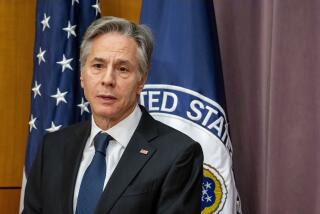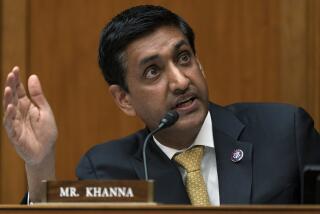Cox, Colleagues Talk Their Way Into Lithuania : Observers: Congressional delegation sent to monitor elections overcomes Soviet delaying tactics. State Department protests finally got them visas.
- Share via
After a week of intense negotiations with Soviet officials in three countries, a four-member congressional delegation was given last-minute permission Saturday to observe Lithuania’s first legislative election since its annexation by the Soviet Union 50 years ago.
“I have my visa in hand,” said Rep. C. Christopher Cox, (R-Newport Beach) from his hotel room in West Berlin, where he has been staying since Wednesday while State Department officials worked to secure permission for the delegation to travel to Vilnius, Lithuania. He plans to enter the country today.
“We were at an impasse (and) the Soviets have obviously succeeded in abridging our trip,” Cox said about the delay, which has cost the group the chance to witness first-hand Saturday’s round of voting. “But this is an important election.”
Also traveling with Cox are Reps. Richard J. Durbin (D-Ill.), William Sarpalius (D-Tex.) and John Miller (R-Wash.).
The observer group, selected by Speaker of the House Thomas S. Foley (D-Wash.), was idled unexpectedly after Soviet officials in East Berlin denied visas to the U.S. lawmakers. Soviets initially claimed that the delegation could not enter the Soviet Union without the invitation of the Supreme Soviet in Moscow.
Since then, Secretary of State James A. Baker III and U.S. Ambassador to the Soviet Union Jack Matlock lodged protests in Washington and Moscow while the four congressmen continued negotiations at the Soviet Embassy in East Berlin, said State Department spokeswoman Anita Stockman.
“We reminded them (the Soviets) that their parliamentarians routinely visit the United States without official U.S. (congressional) sponsorship,’ Stockman said.
In a letter drafted Friday, 11 senators warned that the visa denials would “set an unwelcome precedent for future Soviet decisions on upcoming Congressional visits.”
” ... if the world is to believe that the (Lithuanian) elections were freely held, and that the Soviet Union is serious about its political reforms, outside observers must be allowed to travel throughout Lithuania,” the letter continued.
“We were all exceptionally vociferous in our demands,” Cox said.
As a result of the intense lobbying effort, the Soviets on Friday offered to grant the congressmen visas to enter Lithuania on Tuesday--three days after Lithuanians were to cast ballots for 142 seats in the Lithuanian Supreme Soviet, the tiny republic’s legislative body.
That offer was immediately rejected, Cox said, and another meeting was scheduled for Saturday at the Soviet Embassy in East Berlin. The American delegation walked out of that meeting, however, after Soviets continued to deny any visas to travel before Tuesday.
The congressmen were out of the embassy building and walking down a flight of stairs when a Soviet Embassy spokesman ran after them and told them they would be granted visas for today. He attributed the turnaround “to continuing pressure that was brought to bear on (Soviet Foreign Minister Eduard A.) Shevardnadze and (President Mikhail S.) Gorbachev.”
Cox claimed that the Soviet denial of visas for the group had become “a major issue” in the last moments of campaigning before Saturday’s election, where 75% of Lithuanians were reported to have cast their votes.
“This whole affair has given the Communists a black eye,” Cox said. “The story has been all over Lithuania on television, radio and in the newspapers. People all over (Lithuania) have heard about our struggle.”
He said that he expects the delegation to be greeted by “a huge crowd” of Lithuanians who are struggling for independence.
If a majority of opposition candidates are elected, they will most likely push for secession from the Soviet Union and change the name of the Lithuanian Supreme Soviet, Cox said.
“I think that is the way it is heading,” Cox said. “That’s why these elections are so important.”
The bipartisan delegation was scheduled to arrive in Vilnius about midnight on Sunday and spend 17 hours meeting with opposition candidates in three cities and hold a workshop on democratic parliamentary procedure, Cox said.
Although they will have missed Saturday’s initial election, the congressmen will likely observe dozens of runoff elections, since as many as five candidates are vying for each seat in the Lithuanian Supreme Soviet.
The group, invited by ?the Lithuanian nationalist movement, will also “verify that the first round of Lithuanian elections has been conducted fairly and freely, without interference from the external political or military forces,” Cox said.
“This experience has shown me that, glasnost or not, some things have not changed all that much,” he said. “There is still an enormous gulf between East and West.”
More to Read
Get the L.A. Times Politics newsletter
Deeply reported insights into legislation, politics and policy from Sacramento, Washington and beyond. In your inbox twice per week.
You may occasionally receive promotional content from the Los Angeles Times.








